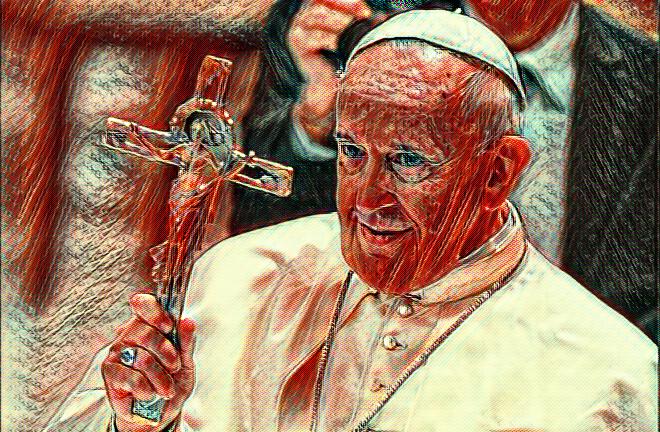Why is it that Catholics call their priests by the title “Father” and the Pope is called the “Holy Father” when we are told to call no man our father?
What is being cited is Matthew 23:8-12: “As for you, do not be called ‘Rabbi.’ You have but one teacher, and you are all brothers. Call no one on earth your father; you have but one Father in heaven. Do not be called ‘Master’; you have but one master, the Messiah. The greatest among you must be your servant. Whoever exalts himself will be humbled; but whoever humbles himself will be exalted.” The language that Jesus uses is a form known as Hebraic hyperbole, stressing matters to absurdity for exclamatory purposes to make a point. It is not dissimilar from when he says that if your eye causes you to sin then pluck it out or if your hand causes you to sin, cut it off. Jesus does not mean for us literally to maim ourselves. Note also that the apostle Paul refers to himself as a father to those whom he has brought the new dispensation. Further, I am always perplexed as to why critics of the Catholic practice see no problem with calling earthly biological and adopted fathers by this title of endearment. Jesus says at the same time not to call any man (master) teacher and yet we also do that all the time. The point that Jesus is trying to make is that there is no true fatherhood that does not on some level reflect our Father in heaven. Ultimately, there is no authority that can compete with God. There is no authentic teacher that can propose truths in conflict with what God reveals to us. Further, no human fatherhood can displace the caring role of God and his love for all of us as his children. The priest is called Father because his vocation involves a spiritual paternity. He watches over and cares for those entrusted to him. Scripture makes it abundantly clear that any notion of an absolute prohibition of the title “father” is absurd.
Matthew 15:4-6 – “For God said, ‘Honor your father and your mother,’ and ‘Whoever curses father or mother shall die.’ But you say, ‘Whoever says to father or mother, “Any support you might have had from me is dedicated to God,” need not honor his father.’ You have nullified the word of God for the sake of your tradition.”
Matthew 19:5 – “‘For this reason a man shall leave his father and mother and be joined to his wife, and the two shall become one flesh?’”
Matthew 19:19 – “… honor your father and your mother’; and ‘you shall love your neighbor as yourself.’”
Matthew 21:31 – “Which of the two did his father’s will?”
John 8:56 – “Abraham your father rejoiced to see my day; he saw it and was glad.”
Luke 16:24, 30 – “And he cried out, ‘Father Abraham, have pity on me.’ …He said, ‘Oh no, father Abraham, but if someone from the dead goes to them, they will repent.’”
Acts 7:2 – “And he replied, ‘My brothers and fathers, listen ….’”
Romans 4:11-12 – “Thus he was to be the father of all the uncircumcised who believe, so that to them also righteousness might be credited, as well as the father of the circumcised who not only are circumcised, but also follow the path of faith that our father Abraham walked while still uncircumcised.”
Romans 9:10 – “And not only that, but also when Rebecca had conceived children by one husband, our father Isaac— ….”
1 Corinthians 4:14-16 – “I am writing you this not to shame you, but to admonish you as my beloved children. Even if you should have countless guides to Christ, yet you do not have many fathers, for I became your father in Christ Jesus through the gospel.”
James 2:21 – “Was not Abraham our father justified by works when he offered his son Isaac upon the altar?”
Filed under: Uncategorized | Leave a comment »


















































